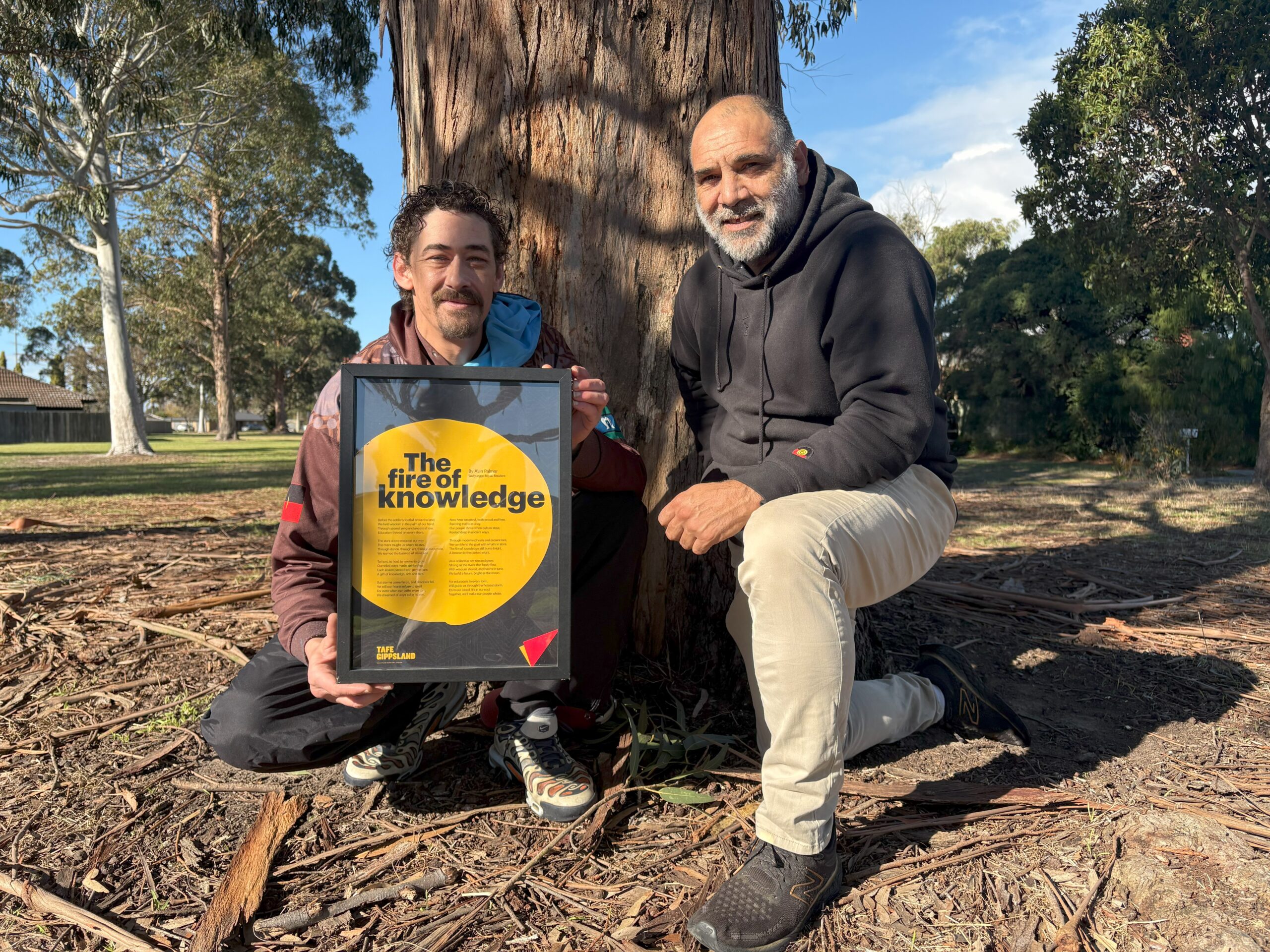TAFE Gippsland

From Anger to Expression: Alan Webb’s Journey of Healing Through Culture and Learning

“Through modern schools and ancient lore, We can blend the past with what’s in store. The fire of knowledge still burns bright, A beacon in the darkest night.”
These eloquent verses crafted by Alan Webb (Palmer) are worlds away from the life he once lived.
Not too long ago, Alan was facing a possible prison sentence, after he descended into a spiral of violence spurred by unresolved anger.
A proud father of six, Alan was mourning the untimely passing of his 19-year-old son and didn’t have the resources to process his grief and anger.
“After the loss of my son, I went into a spiral of anger I’ve never felt before,” Alan explained.
“I was angry with the people who were responsible for his death, I was angry with the police and I was angry with society.”
After an act of violence, instead of a prison sentence, Alan was given the option to attend a residential diversion program at Wulgunggo Ngalu Learning Place at Won Wron in central Gippsland.
This opportunity that was the impetus for Alan’s journey of reconnecting with culture, learning how to express and control his anger, engaging in further education and beginning the process of healing.
Conveying his feelings on paper was one way Alan found he could decompress.
“I’ve always used writing as a dark form of self-expression, I’ve written about some pretty dark stuff,” he said.
“It was through my writing and with the help of Wulgunggo Ngalu that I was able to express what happened to my son.
“I wanted to change myself… I was sick of feeling the way I was. Words are powerful.”
In addition to the programming delivered at Wulgunggo Ngalu Learning Place, Alan also engaged with TAFE Gippsland educators who were delivering horticulture classes. He participated in activities including learning how to propagate native plants and the creation of a bush garden.
This interaction also led to connections with TAFE Gippsland’s Koorie Support Team, who engaged with Alan about his writing and possible opportunities for him to enrol in further education following his return home. One of his poems, The fire of knowledge, has been graphically designed by TAFE Gippsland, framed and now holds pride of place on the walls at Wulgunggo Ngalu Learning Place and TAFE Gippsland’s Koorie Units. Alan is also being supported to take his writing further, enrolling in Certificate IV in Professional Writing and Editing.
“Writing is something I love doing, and it has played a huge part in my mental health. I never saw it as a way to reach people,” Alan explained.
“The course is in creative writing and journalism which will be good. It will be good to tell stories of people like me who need a voice.”
TAFE Gippsland Head of Department Foundation, Youth and Koorie, Lynda Capes, said the relationship with Wulgunggo Ngalu makes a real difference.
“It’s about working together to give our Koorie community every chance to take that next step — whether it’s training, further study or just building confidence,” she said.
“When support is culturally safe and personal, people feel seen and heard. That’s what helps students like Alan believe in what’s possible.
“And when one person takes that step, it often opens the door for others to follow. And the impact goes beyond just one person — it strengthens the whole community.”
“We’re proud of what we’ve achieved so far, and we’re committed to continuing this collaboration so more mob can see what’s possible for their future.”
The General Manager of Wulgunggo Nalu Learning Place, Shaun Braybrook said culturally appropriate education and support was the key to turning lives around.
“Understanding where you fit in our Aboriginal world and drawing from ancient cultural knowledge in order to regain status as an Aboriginal man and “a protector of kin” can only put Aboriginal men on the right and proper track,” he said.
“That is the strength of being part of the Wulgunggo Ngalu community of men.”
While Alan still has some struggles ahead, he credits his time at Wulgunggo Ngalu and the opportunity to engage with his culture and further education as a turning point.
“If I had been incarcerated, I would have turned into a monster, it would have led to a life of crime,” he said.
“I’m so glad I went there – it changed my life.”
